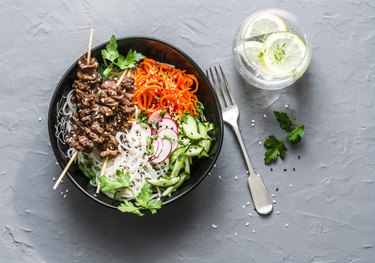
Water chestnuts are not nuts, but are the tubers of aquatic plants. Raw or cooked, you have probably had them at a Chinese restaurant in dishes like stir-fry or chop suey. Water chestnuts belong to the non-starchy, low-calorie vegetable group and are ideal for people who have diabetes' diets, according to the American Diabetes Association. Try adding them to salads, soups, wraps or even pizza and take advantage of the health benefits of water chestnuts.
Read More: How to Prepare Canned Water Chestnuts
Video of the Day
Video of the Day
Zero Cholesterol and Fat
When looking for cholesterol-free and fat-free foods to add to your meal plans, water chestnuts fill the bill. You can lower your risk for heart disease and stroke by maintaining your blood cholesterol level, and adding water chestnuts to your meals can help you do this. Water chestnuts' zero-fat content may help prevent weight gain. Because water chestnuts are a high-volume food, they can keep you full for a long time. Water chestnuts are also low on the glycemic index, meaning the carbs are released slowly.
Read More: Cholesterol Health
Water Chestnut Nutrients
A half-cup of water chestnuts contain 10 percent of the daily value of each of the following: potassium, copper, B6 and manganese. Other nutrients in water chestnuts include thiamine, riboflavin, vitamins C and E, magnesium, phosphorus and zinc, according to Self Nutrition Data. Each of these minerals play a role in your overall health. Vitamin B6 supports healthy brain and immune system function, while thiamine and riboflavin help your body convert food into energy. Your heartbeat maintains a steady rhythm with the help of potassium, while copper aids in red blood cell production. Manganese helps build bones and also aids in metabolizing carbohydrates and cholesterol, says Harvard Medical School.
Low-Calorie Choice for Diets
Water chestnuts have only 60 calories in one-half cup, probably due to their high water content, so you don't have to worry about eating a little more of this nutritious vegetable if you are counting calories. Choose water chestnuts for a healthy low-calorie snack while sticking to your diet.
Fiber for Healthy Digestion
With 1.9 grams of dietary fiber, water chestnuts supply 7 percent of your daily value per half-cup serving. Men younger than age 50 need 38 grams of fiber each day, and women under age 50 should consume 25 grams, according to the Mayo Clinic. Men older than 51 years of age should aim for 30 grams, while women the same age should try to get 31 grams per day. Fiber is not only necessary for maintaining bowel health; it also helps lower cholesterol levels, assists in weight loss, helps stabilize blood sugar and lowers blood pressure.
Read More: What Does Fiber Do for Your Body?
Antioxidants to Fight Free Radicals
Water chestnuts have antioxidant characteristics due to a number of compounds they contain. One of these antioxidants is called ferulic acid, says Healthline. Ferulic acid has shown an effect on neutralizing free radicals involved in chronic diseases. This was proven by a 2016 test-tube study that investigated the anti-tumor activity of ferulic acid in breast cancer. Results of the study, published in Oncology Reports, found that ferulic acid helped to not only suppress the growth, but kill breast cancer cells, too.
Another natural antioxidant in water chestnuts is flavonoid. Flavonoids have also shown to have free radical-scavenging activity and disease-fighting capabilities. A 2016 Journal of Food Science study used Chinese water chestnut peel extract to conclude that water chestnut extract has an anti-tumor and antioxidant effect and helps to scavenge nitrates.
- USDA: National Nutrient Database for Standard Reference: Nuts, Chestnuts, Chinese, Boiled and Steamed
- Harvard Medical School: Listing of Vitamins
- PubMed: Ferulic Acid Exerts Antitumor Activity and Inhibits Metastasis in Breast Cancer Cells by Regulating Epithelial to Mesenchymal Transition.
- PubMed.gov: Antitumor, Antioxidant, and Nitrite Scavenging Effects of Chinese Water Chestnut (Eleocharis dulcis) Peel Flavonoids.
- HealthLine: 5 Surprising Benefits of Water Chestnuts
- SelfNutritionData: Water Chestnuts, Chinese, Raw, Nutritional Facts and Calories
- MayoClinic: Nutrition and Healthy Eating: Dietary fiber: Essential for a Healthy Diet
- Livestrong.com: How to Prepare Canned Water Chestnuts
- Livestrong.com: Cholesterol Health
- Livestrong.com: What Does Fiber Do for Your Body?
- Livestrong.com: Cholesterol Levels
- Livestrong.com: Fiber
- Livestrong.com: What Are the Health Benefits of Flavonoids?